229 free CV templates in Microsoft Word | Page 2
Jump to: Page 1 | Page 2 | Page 3 | Page 4 | Page 5 | Page 6 | Page 7 | CV guide | CV content |
If you find a template that you like, we'd appreciate a review or a 'Facebook Like' and we'd absolutely love it if you shared this page!
Latest CV templates:
Customer Service Assistant CV template
A neatly styled professional CV template with sample information for a Customer Service Assistant. Using the Cambria font with a range of neat headers and colour for emphasis, this ATS-compliant CV makes a great impression.
Retail manager CV template – free UK example in Word
This CV template has a soft grey background with white boxes to highlight info. The tables format makes editing & adding further sections easy. It’s a great choice if you’re sending out PDF or print copies of your CV.
Programmer CV: free Microsoft Word template
This CV template in Microsoft Word uses the Open Sans font and Microsoft Word’s columns feature to create two neat columns which extend over a second page. The simple layout has a fresh modern feel.
Childcare CV example (Word template with sample content)
A stylish template split into two parts with your personal information on the left, a dividing line and the rest of your details on the right. This layout makes use of the professional Garamond font for an attractive finish.
PR CV template (example content for public relations or international roles)
A fresh modern PR CV template with a clutter-free theme, designed with international or PR jobs in mind but equally suited to a wide range of professions. Lots of white space & neat dividers gives it a modern feel.
Acting CV template with example content (free, MS Word)
#212: A 1-page free acting CV template with example content to help you write your own CV as an actor/actress. Get more auditions with this professional layout that is easy to edit & adapt to your own requirements.
Professional CV template in Word : ‘Achiever’ design
A professionally designed CV template, spread over two pages with all the sections you might need & full instructions. Uses the free Garamond font. Free download with sample information for a Marketing Manager.
Academic CV template with example content
A 2-page academic CV example with a simple layout and sample content to inspire either an undergraduate / postgraduate / Masters degree or PhD application, or application for a research post.
CV for teenager: free CV template for a 13, 14 or 15 year old with example content
A fantastic CV for teenager job applicants – a simple crisp template with example information to help you if you are a applying for a part time job at 13, 14 or 15 & have little or no conventional work experience.
Skills based CV
A skills-based CV spells out to prospective employers how you have acquired/used the skills they need for a particular job role. Sample information included for an Administrator role.
Receptionist CV example
This two column Receptionist CV example includes sample information for a Receptionist role, with a basic font, coloured headers and an easy-to-read layout.
Functional CV template (free) with guide
Our Functional grey CV template has a simple, basic layout that’s ATS-friendly and easy to read. Soft grey headers divide up the core sections. Sample information for a Customer Services Manager.
Free Basic CV template 2021 – Word format
A super-clean basic CV template that uses one of the most popular CV fonts and a really simple layout. Suitable for all types of job application, roles and industries. Get the job you deserve with a new fresh CV!
Nursing CV example: Bulleted detail CV layout in MS Word (free)
Our ‘Bulleted detail’ nursing CV example is a lovely fresh template with a super-clean table-free layout that will easily adapt to your personal information. The classic Garamond font is always a winner.
Director CV template: free ‘Smart Division’ design in Word
Our Director CV template has a ‘Smart Division’ design which suits a wide variety of roles, from administration through to high-end management. The layout includes smart titles, a slim border and grey accents.
Web designer CV template : free Word download
This clean, fresh 2-page web designer CV template with a focus on work experience is great for a wide variety of roles. Print on high quality paper with a good printer for the perfect CV to grab the employer’s attention.
Business analyst CV sample (UK) : free Microsoft Word download
One-page CV templates are on trend at the moment, and this free CV template is a great example of why. Its eye-catching three column design is easy to customise and it’s not difficult to add further pages if needed.
Digital marketing CV template to download (free, Microsoft Word)
In this version of our two-page bordered CV template we have created a more printer friendly version of the design that swaps out the black title box for a grey header – perfect for those sending out paper CVs.
Marketing CV example: free template download in Microsoft Word
A two-page layout with a bold border, an eye catching heading, a splash of colour and the lovely free Open Sans fonts. The two columns neatly split titles from core information, making this CV easy to skim through.
Electrician CV template: free example in Microsoft Word format
#222: Download & edit this ATS-friendly 2 page single column template – a perfect example for UK electricians & similar positions. A lovely layout with splashes of electric blue, dividers & a spaced font.
Software Developer CV template : Free ‘Connect Lite’ design in Microsoft Word
A 2-page free template in Microsoft Word with sample content for a software developer. Based on our ‘Connect’ template but with a lighter header, this UK CV template places a large focus on skills / achievements.
Mechanical engineer CV template – free example in Microsoft Word
#221: A smart ATS-proof two page CV with example content for a mechanical engineer. Dark blue headings, a soft dotted border & smart use of spacing makes this a template that is both machine & human friendly!
CV for internship | Free Word CV template to download & edit
We show you how to use work placements, activities & non-traditional experience to create a strong CV for internship applications in the workplace. The simple ATS-friendly layout is easy to edit and work with.
Waitress CV example : free CV template (Microsoft Word)
An elegant UK CV template for a waitress that uses the classic Garamond font, and Burgundy accents – a simple border, neat headings and subtle shadows. ATS-friendly and easy to edit in Microsoft Word format.
Accountant CV example: free accounts-themed CV template in Microsoft Word format
A very smart, clean two page professionally designed example CV for a UK accountant that would ideally be suited to a finance, business or analyst type role. Skills-focused with an eye-catching crisp layout.
Legal CV template: free law-themed Word download
This supersmart legal CV template is designed with a practising UK solicitor or lawyer in mind but could be adapted for any other professional legal role. Neat icons, 2 columns & a splash of colour help it stand out.
Graphic designer CV template in Word (free download)
This lovely graphic designer CV template in Microsoft Word format has a simple, eye-catching design and offers clear presentation of your information. Originally published Sept 2018 & updated for 2020.
Artist CV example (template to edit) | Microsoft Word
Our two page artist template is a great example of how to write an artist CV. It provides the perfect starting point for artists applying for exhibitions, residencies or other types of professional opportunity.
Teaching assistant CV : bold CV template (updated 2020)
This free teaching assistant CV template in Microsoft Word uses bold headings and a beige border, creating a simple, subtle design detail to give you a very professional looking, well presented CV or résumé.
Waiter CV example (sample CV content, UK template)
To give this waiter CV a truly restaurant feel, we’ve presented it with a ‘menu card’ background & a traditional font (Old Standard TT). Contrasting headers add to the lovely look and feel of this layout.
TEFL CV template (free MS Word download)
This free two-page fresh Word CV includes sample content tailored for a TEFL (Teaching English as a Foreign Language) role. A simple, crisp layout, this template can be used for any industry or profession.
Nursing CV – free Microsoft Word template
A two-paged simple, fresh nursing CV template that has few graphics or distractions. Spacing, shading and borders are used to present the sample content in an attractive way to help you stand out from the pile.
Free hotel worker one-page hospitality CV template (Word format)
#208: Our one-page hotel worker CV is a great starting point for those looking for hospitality work. With a smart two-column layout and attractive font, this example can also be adapted to suit any role.
ATS system CV template : free smart design in Microsoft Word format
This simple, smart ATS system CV template uses minimal layout techniques to create a CV that is beautiful, clean, simple and smart. Crisp and modern with plenty of white space, it makes your information so easy to read. Sample info for a Customer Care Assistant.
Skills based CV template in Word – ‘Connect Quotes’ design
A spin on our popular Connect CV template, this skills-based layout replaces the photo with a quote box for a snippet from one of your references or a key achievement. Super impressive design that works well as a PDF. Sample info for a Marketing Consultant.
Accountant CV: free ‘Wave’ professional Word CV template
A beautifully designed accountant CV with a subtle wave background and contrasting headers. Classic Garamond font, square bullet points & optional photo space all add to this stylish CV layout.
Accountant CV template: ‘Flourish’ layout in Microsoft Word format
This 2-page accountant-themed CV uses a variety of ways to section off your information, from bordered boxes to bullet points, coloured blocks and stylish lists. Subtle & stylish, it’s great for printing or PDF.
Administrator CV template (free) in Microsoft Word format
#196: A 1-page 2-column smart administrator CV that is suitable for lots of roles. Subtle icons, vertical text, soft shaded headers & a crisp font give this modern template a highly professional appearance.
Free Retail CV/résumé template in Word
This is a simple effective one-page retail CV that works as either a CV or résumé. It’s filled out for a retail sales job but would suit lots of other positions. A fresh bright layout with a professional feel.
Core sections of your CV
Each of the core sections mentioned above will be considered in turn.
Personal details

The standard CV format will start with your personal details at the top. Here is what you would usually expect to see:
Name
Your name should be in a larger font than the rest of the CV so it stands out. After all, this is your chance to market yourself! If the employer can clearly see who they are reading about, it will help to keep your name fresh in their mind.
Middle names are optional, and you obviously need to avoid any nicknames like Mike 'Speedy' Smith. Always keep the format of your CV professional, and remember that you have no clue who will be reading it and how they will perceive any informalities.
Title is optional (Mr, Mrs, Miss, Ms) and rarely used.
Professional letters (such as those denoting degrees) should be included if relevant to the role.
Contact details
Include a phone number and email address - however, for obvious reasons don't put down your current work contact details. Also, it is good idea to create a new e-mail address specifically for your CV to ensure it looks professional.
For example:
'jennifer.lounds@gmail.com'
...looks far more professional than:
'loundsyjay888@gmail.com'
Creating a new e-mail specifically for your CV will also make it easier to spot any messages. Can you imagine if you received an e-mail requesting an interview and it went into your junk folder along with a million others and you missed it? If you're worried about checking two email accounts, set up forwarding from one account to the other. You can then log into your professional email account to reply.
It's essential to put a phone number on your CV that you know you will be able to either answer immediately, or at the very least reply to very quickly. Don't forget to also remove any jokey answer machine message.
If you are worried about answering the call whilst you are at work, you could state some times on your CV when you are available.
Finally, most people include their address. Few UK employers send out interview invites by post these days, but it's good to include an address just in case.
Marital status and family (optional - not recommended)

Talking about your family on your CV may lead an employer to wonder if you struggle with family commitments - even if there is no actual cause for concern.
These details do not have to be included on your CV; however you may decide that it would benefit how the employer will perceive you. For example, if you are working with children, being a family man/woman may help establish that you are comfortable around them. But it really depends on the role you're applying for and the organisation you're applying to.
Remember, giving details about marital status and family is completely optional and it's best to leave these out if you have any doubts. Only include them if you're entirely confident that including these details will benefit you.
The employer cannot make a decision on whether to hire you or not from this information as per the Equality Act. However, be aware that some UK employers may discriminate 'behind closed doors' and you will have no way of knowing if this is why you didn't get an interview.
Date of birth (optional - not recommended)
Similar to your marital status and family life, your date of birth is not compulsory for a CV. You cannot be discriminated against based on age when employers are making the decision to hire you or not.
Again, deciding whether or not to include your date of birth comes down to personal choice and your potential knowledge of the industry. If you are worried that your age may put off an employer from requesting an interview (too young or too old), then don't put it down.
UK employers should not filter candidates for an interview based on age, gender or such other protected characteristics. However, it's impossible to know whether good practice has been adhered to or not. It is therefore better not to take the risk.
Nationality (optional - not recommended)
Your nationality is of no concern to the employer and doesn't need to be stated unless it is 100% relevant to the role. An example of where nationality could be relevant is for a translator or language teacher role. The same legislation above also prohibits discrimination on the grounds of nationality or race.
Additional information
You may need to provide additional information depending on the job you are applying for. It could be a driving job, so stating that you have a full UK driving licence will show you are already ticking that box.
Another great example is if you are applying for a computer or website based role. For such roles, you would use this section to showcase your talents with links to website or ventures you've created yourself.
Photo
There are mixed opinions about whether it is a positive or negative to include a photo on your CV. Certainly, if appearance is important to your job, it makes sense to include a professional headshot. For more considerations of the pros and cons, read our article 'Should I include a CV photo?'
Personal statement (3 - 4 lines)
Sometimes the personal statement is known by other names such as 'objective', 'profile', 'career goal' or 'introduction'.
This is one of the most important parts of your CV as it's essentially the crux of your job application. A good statement can increase your chances of the employer noticing your CV. On the flipside, a poorly written statement will lower the chances of them wanting to know more.
It should set out:
(a) who you are;
(b) how you meet the job spec; and
(c) what you are looking for.
Here is an example of a good personal statement:

Here is another example:
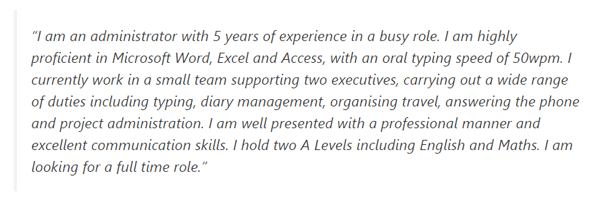
And one more...

When you're writing your personal statement, focus on the job specification and pick out the most important points the employer is looking for.
Work experience

If you're short of work experience, consider volunteering.
As noted above, work experience (or 'employment history') is most commonly listed in reverse chronological order (with the most recent position first). It's fine to include part time and voluntary roles in this section.
When listing your work experience, a typical CV format to use is:
- Job title
- Months/years that you have held the position
- Company name.
- Some people include the location - this is optional but more important if there is some relevance in the location (for example, if the Company has multiple branches).
Here is an example of the structure to use:
Office Manager (job title) - Jan 2013 - March 2016
Bricks & Mortar (company name)
(Insert a brief description of what the company does)
My responsibilities included:
(Bullet point list)
Achievements included:
(Name or list one or two key achievements)
Highlight relevant work experience
Remember to highlight parts of your work history that are relevant to the role/industry you are now applying for. There is no need to create a huge list of tasks and responsibilities under each role if they will not make an impact on this new position.
For example, if you are applying for a sales job and you have some sales experience, this is a great opportunity to highlight these roles and present some fantastic results. Were you the top salesman for three consecutive months? Make sure you highlight this.
For more on work experience, particularly when you don't have much to list, read our article 'Building your work experience'.
"Using bullet points can help to give your CV more impact, especially if combined with ‘Action Verbs’ such as achieved, accelerated, accomplished, completed, improved, delivered, enhanced, finished, negotiated, obtained, produced, secured, increased, doubled or implemented." ~ Imperial College of Science, Technology and Medicine
Qualifications (highest level to lowest level)
This section is quite self explanatory, but it's worth noting that you can again consider what is the most important and relevant to the role you are applying for. You may wish to exclude lower level or irrelevant qualifications.
Don't forget to also show what grade you achieved IF this would enhance the qualification.
The typical format for higher level qualifications is to give the qualification and institution where you studied - for example:
BSc Computer Science (Upper second class honours) - Jan 2013 - March 2016
University of Liverpool
For lower level qualifications, such as GCSEs and A Levels, it isn't absolutely necessary to name your school or college. You certainly do not need to name earlier schools.
There is no greater thing you can do with your life and your work than follow your passions – in a way that serves the world and you.
~ Sir Richard Branson
Skills

Skills should be either directly relevant to the role, or useful to your employer.
When creating a skills section for your CV:
- Present skills as a list
- Divide hard skills (i.e. typing) from soft skills (i.e. communication)
- Avoid fluff, i.e. 'I work well in a team'. Try to give real examples instead.
- Focus initially on key skills mentioned in the job advert.
- Do also mention any skills that, whilst not directly relevant to the job, could be beneficial to your employer. For example, most legal organisations would value the ability to write legal blog posts.
- Think about what skills you've acquired from your past work experience and how they can be used in the new role.
- Consider ways of presenting the list to make it more readable - for example, two columns with hard skills on one side and soft skills on the other.
Focus primarily on skills that are either directly related to the role or are transferable - like computer skills, spreadsheets, databases, bookkeeping etc.
You may find our list of hard skills helpful.
Interests and hobbies

Listing sports or fitness activities amongst your interests tells your employer that you take an interest in your health=fewer sick days!
When writing your hobbies and interests section:
- List 3 - 5 hobbies
- Emphasise any health-enhancing activity (sports, fitness etc)
- Choose hobbies that put you in a good light from an employer's perspective
- Avoid overly quirky hobbies - save these for when your new colleagues have got to know you better!
Although this section may seem quite insignificant, you'd be surprised at how often a recruiter looks at this section with a keen eye. This is one of the best areas of a CV for an employer to get an idea of your personality.
For example, you may enjoy volunteering at the local woodland park at the weekend. This would give employers a sense that you are someone who is helpful and generous. It also suggests you like to work hard without expecting a huge reward other than job satisfaction. You can also use hobbies to demonstrate soft skills such as teamwork and communication.
You can see how important this section can be when the employer is trying to build up a picture of what you are like in their mind. Whilst mundane hobbies won't usually harm your chances of an interview, desirable hobbies and interests may help.
What to avoid:
You must avoid stating these kinds of hobbies:
I like socialising on the weekend
This basically means you like to get drunk on Saturday night!
I like hanging out with my friends
It might be true, but it doesn't sound very interesting!
For more on preparing the interests and hobbies section, read our article 'Does the hobbies and interests section of my CV really matter?'
References
- Give two references - one should be your most recent employer and the other should be a personal reference (ideally a professional person, and not a family member)
- If you don't want to give your most recent employer just yet, write 'References available on request'.
You may have a fantastic long list of references from past managers and supervisors. No doubt every one of them would provide you with a glowing recommendation. However, you need to narrow it down to the people who would make the greatest impact on the new employer.
For more information on how to create an amazing reference section, read our article 'Choosing the right CV references - what to include'.
Additional CV sections
Other sections you might want to include in your CV (depending on relevance) are:
- Achievements
- Awards (relevant to the role)
- Memberships (relevant to the role)
- Publications that you've contributed to (relevant to the role)
- Endorsements
Achievements
Include achievements either within your work history, in a separate section or a combination of both. They can also be dotted around your CV where there is space (although take care not to clutter the layout). In this example two-page template, you can see how achievements work well in their own section:
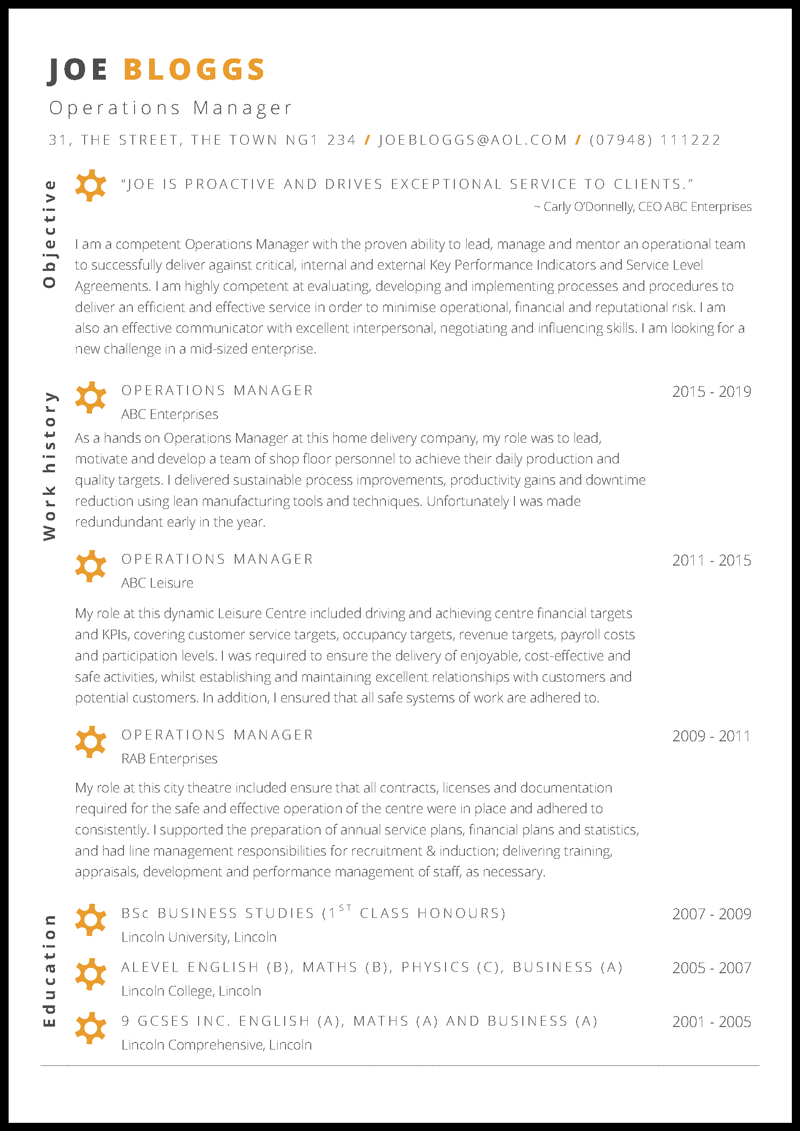
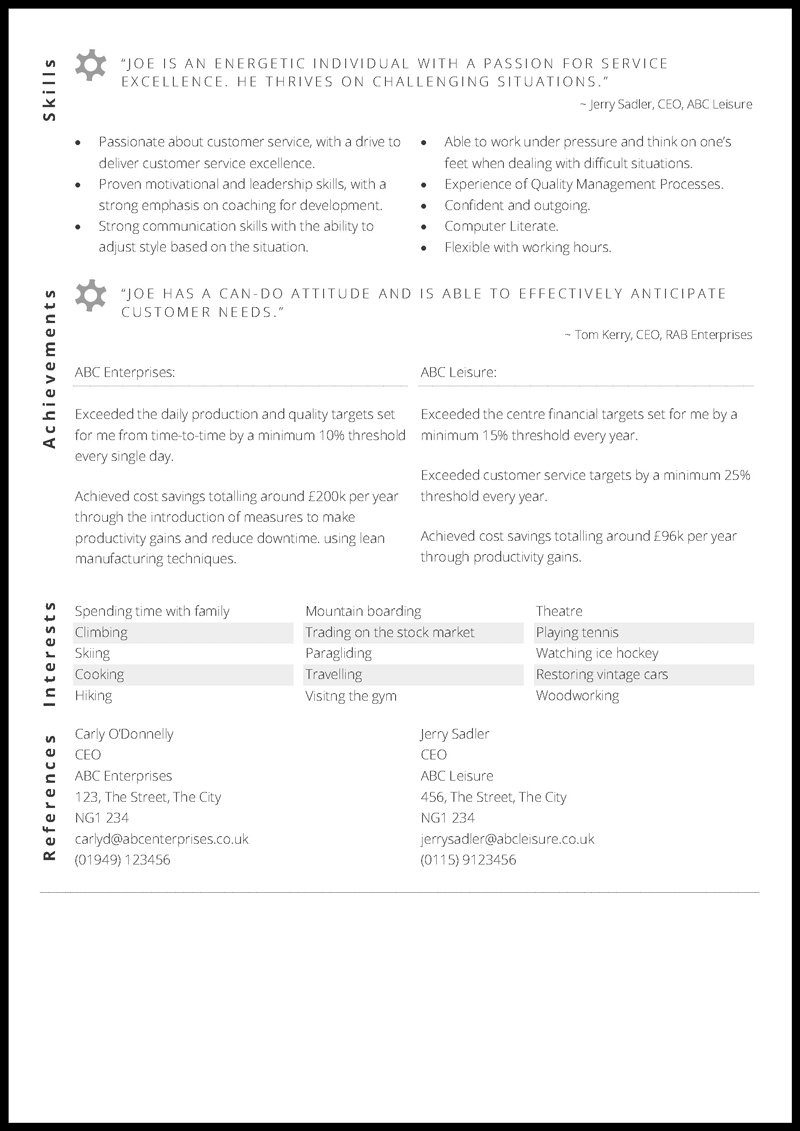
The above free CV format can be downloaded here.
Awards
If you've received an award that's relevant to your role, go right ahead and boast about it! Awards help build your credibility and demonstrate your achievements They are a third-party endorsement and they can therefore give your CV a valuable boost.
Memberships
Being a member of a professional body shows that you're interested in the industry and involved with its development. It can also help to demonstrate that you're staying up-to-date with industry developments. You'll see that we recommend various professional bodies in our featured careers sections (links above).
Publications
Whether you're a regular contributor to your company blog or you've penned something for an industry mag, now's the time to brag about it. A publications section can demonstrate you're interested and actively involved in your target industry. It demonstrates to the employer that you have knowledge, passion and great written communication skills.
Endorsements
Endorsements don't need their own heading - they can go wherever there is space. Alternatively you can add them underneath your references. They are a brief testimonial which may come from your references or from some other credible person. Like awards, they are third-party proof that you're a worthy candidate. A strong endorsement can give your CV a valuable boost.
Popular CV layouts:
Rate our CV template collection
Did our CV library help you out today? We would love it if you could rate us. You can also rate individual templates on their download pages.
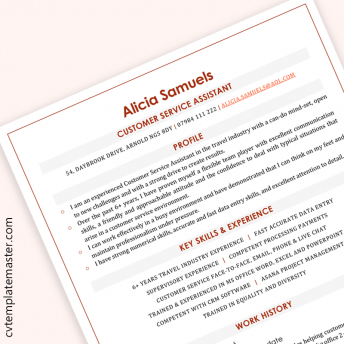
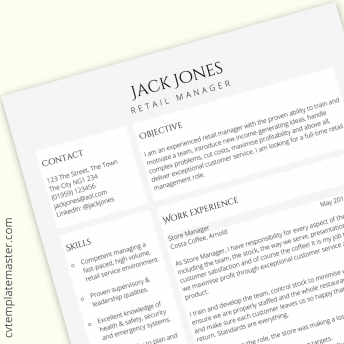
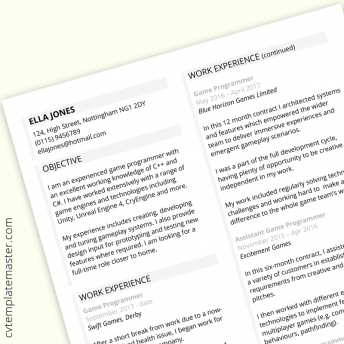
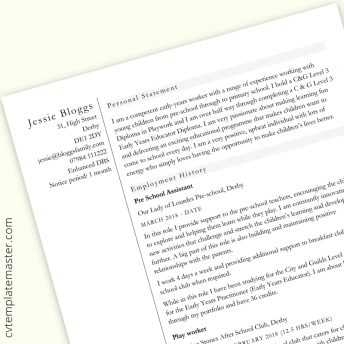
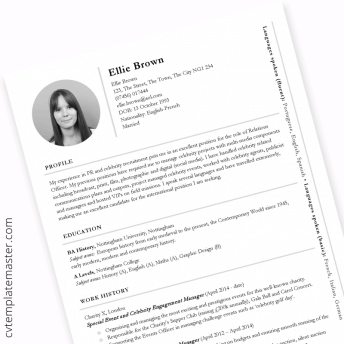
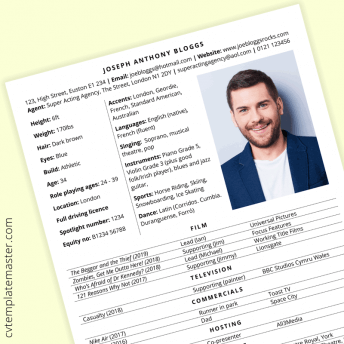
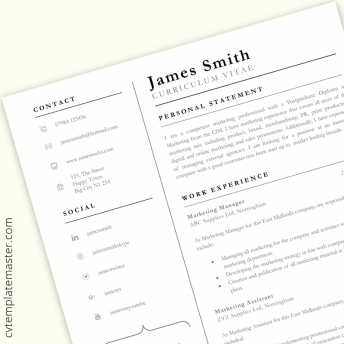
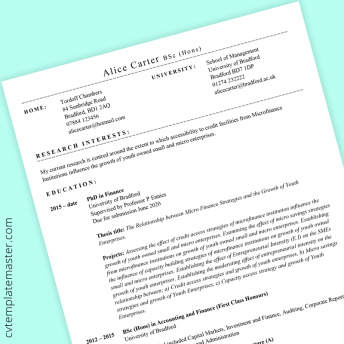
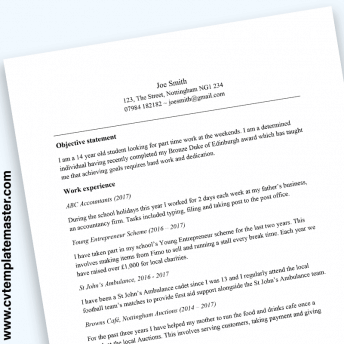
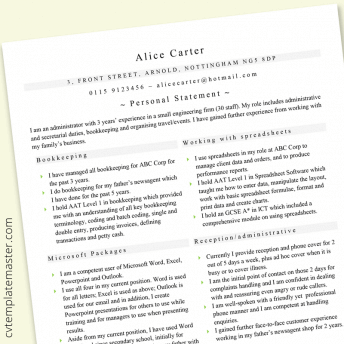
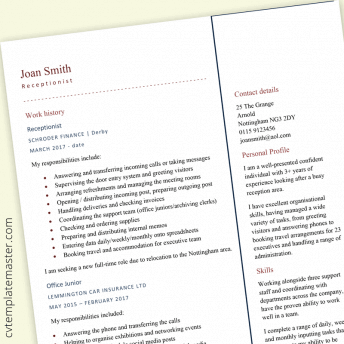
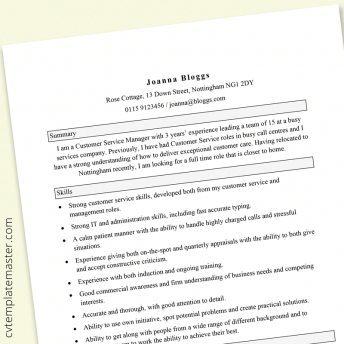
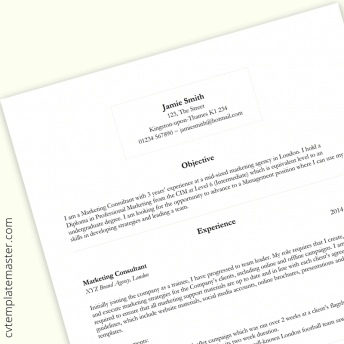
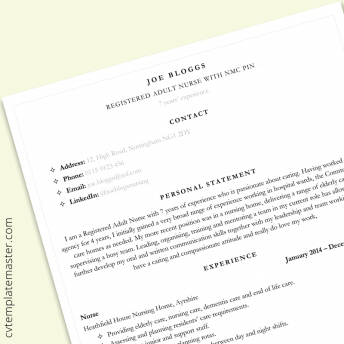
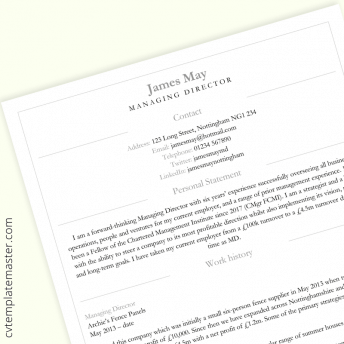
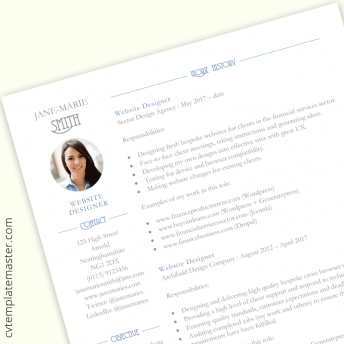
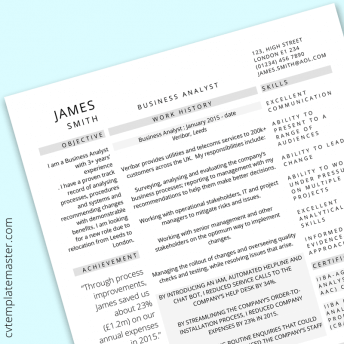
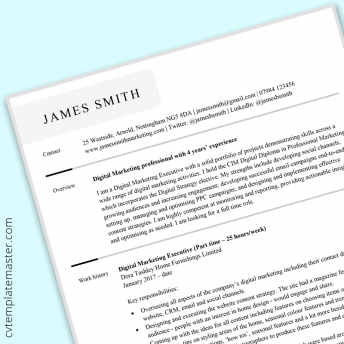
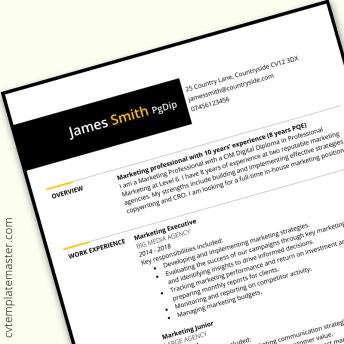
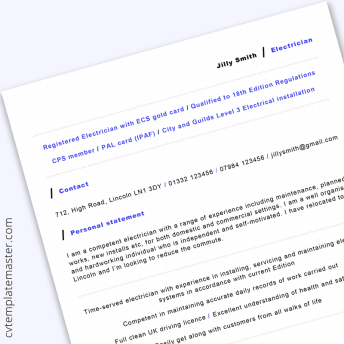
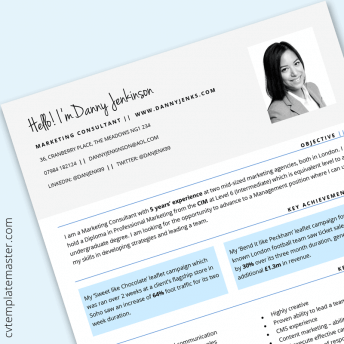
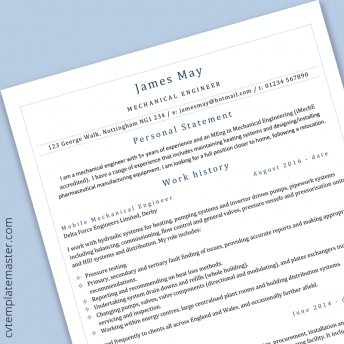
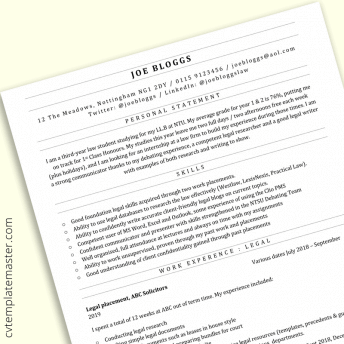
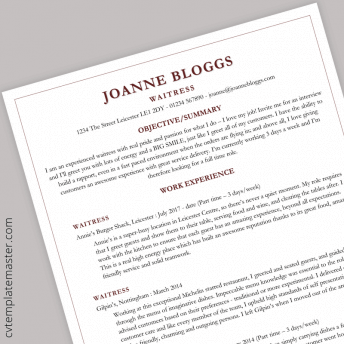
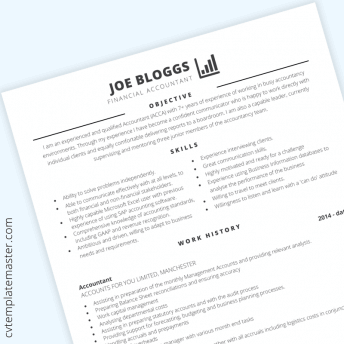
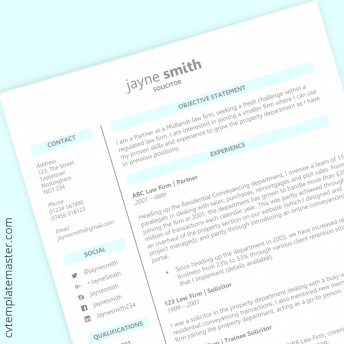
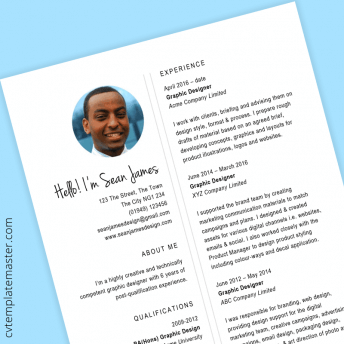
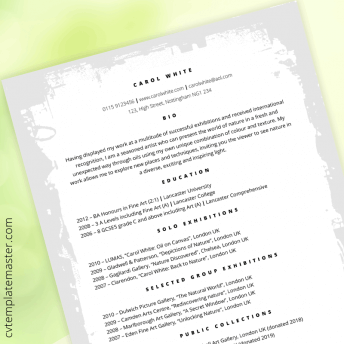
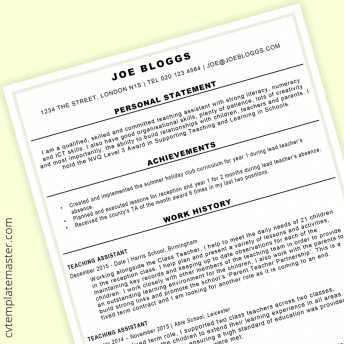
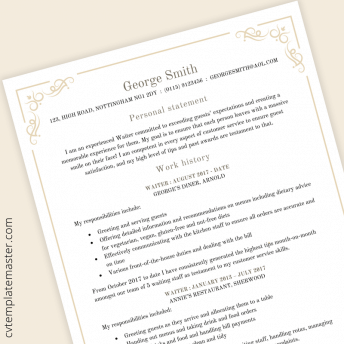
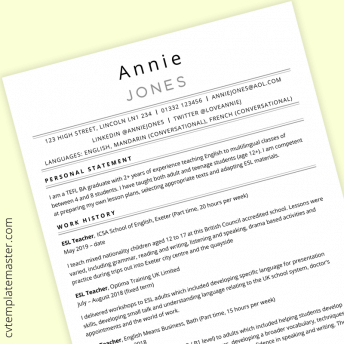
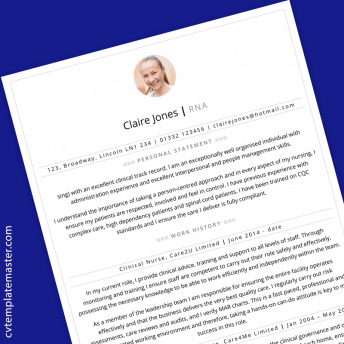
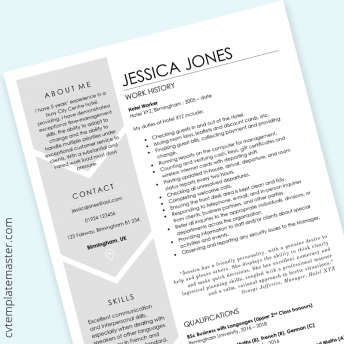
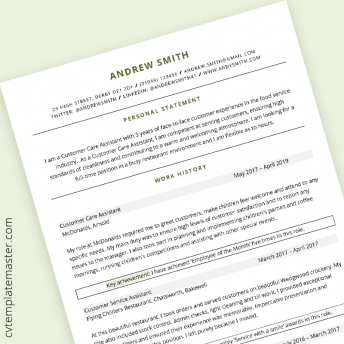
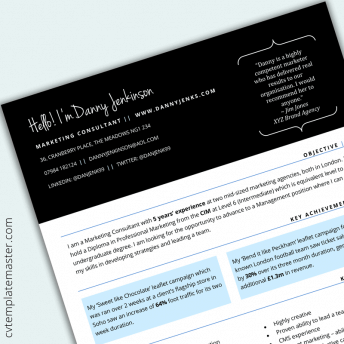
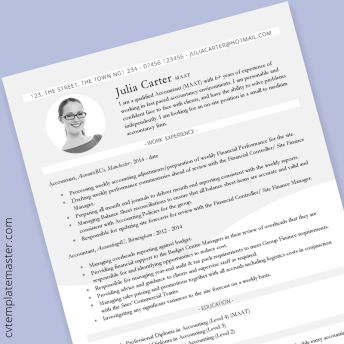
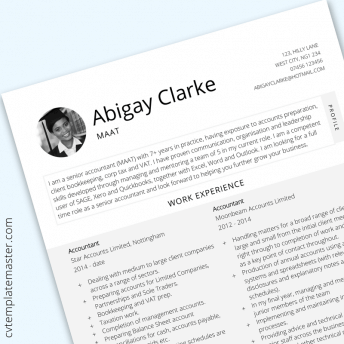
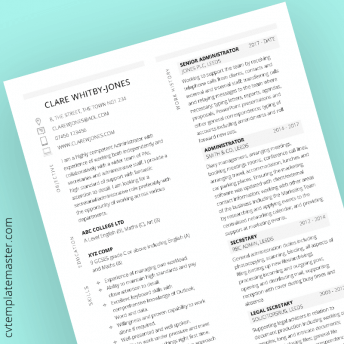
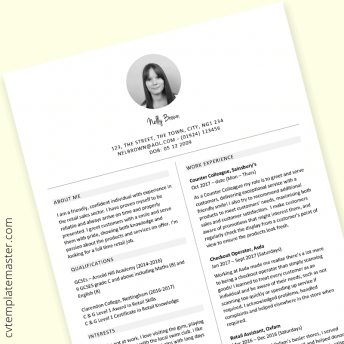
Leave a comment